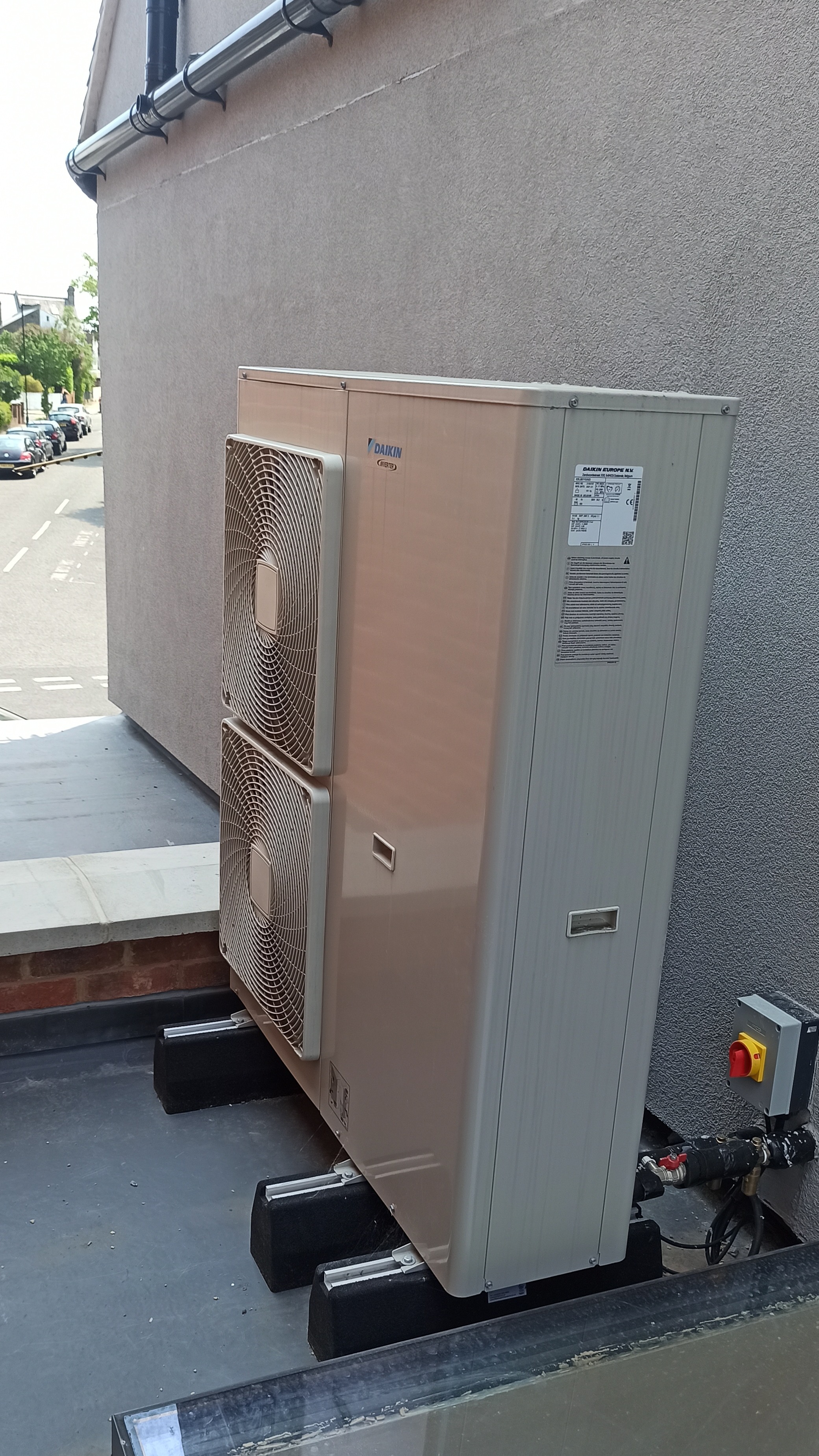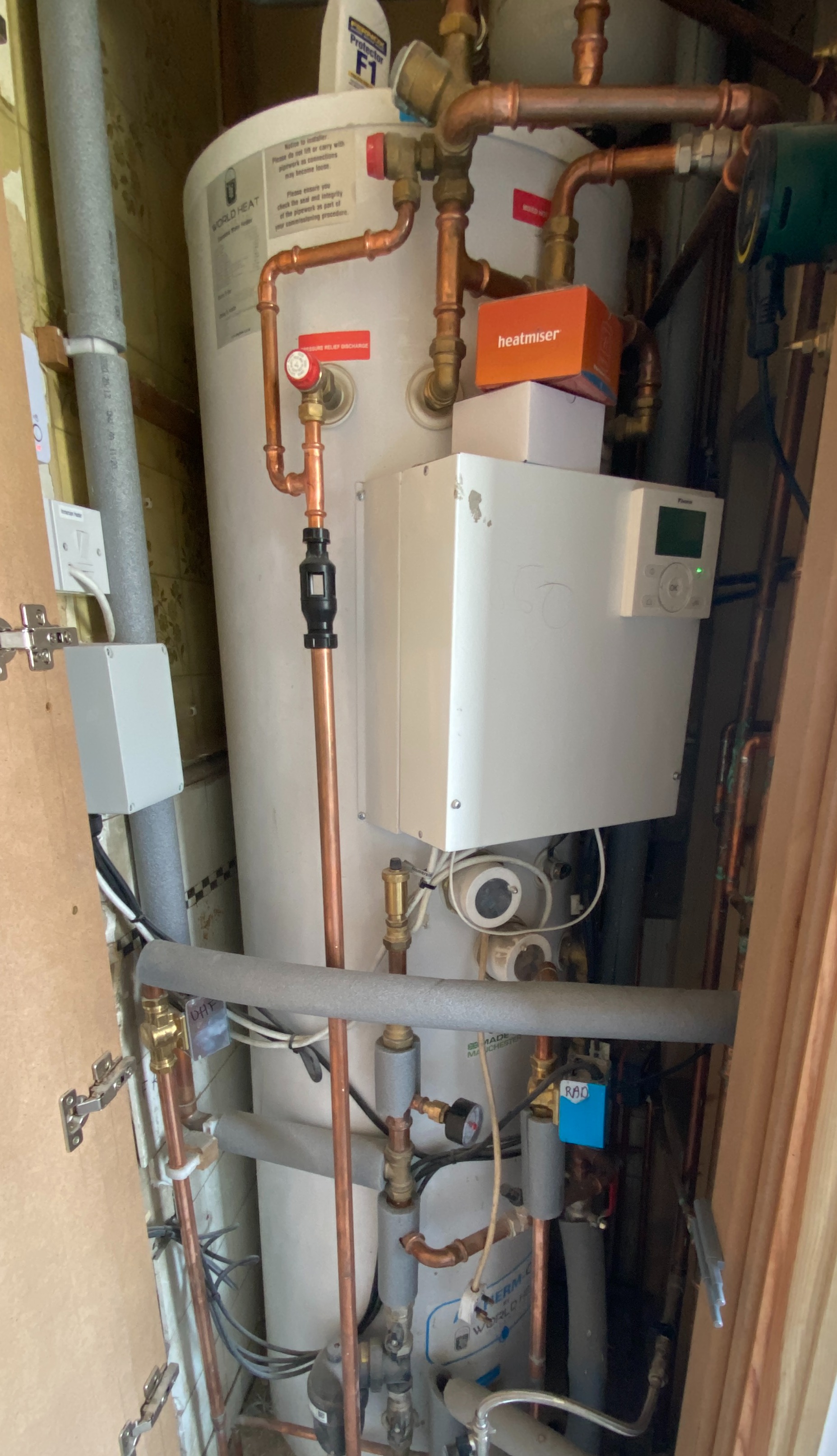Time for a reality check on heat pumps for smaller homes
More homes in our area are getting heat pumps installed. And that's great: heating your home with one of these devices, getting rid of a gas boiler, can cut your carbon emissions more than getting an electric car. It's a vital step in combating climate change.
But the homes that have heat pumps are typically large. They’ve plenty of room for internal equipment and there’s a big garden for the external condenser unit. But what about smaller homes? With none local to view, I grabbed my passport and headed to South Norwood in South London to visit Max and Juliette. Their home was built as a two-and-a-half bedroom home in the 1930, with solid walls that don’t permit cavity insulation and wooden floors that leak heat downwards — the same basic construction as many homes in Hampstead Garden Suburb. In June 2022, they removed their CO2-belching gas boiler and installed an electric heat pump.
Has it kept their home warm during the winter? Yes.
Has it been reliable? Yes.
Has it caused huge problems with noise? No.
Have they saved money? Probably (although more on that later.)
Cleaner and greener
"The main reason we got it is that we wanted to use less fossil fuel," says Max. He notes that the UK's electricity supply is becoming increasingly green (In 2022, 35.9% of UK electricity was from green sources, including nuclear).
He and Juliette are, stage-by-stage, improving the thermal efficiency of the house, such as reducing the draughts caused by gaps in floorboards. But this work still needs to be completed. Compared to a home in HGS, the main difference is that it has been possible to fit conventional, energy-efficient double-glazing windows. This may reduce heat loss by 5% to 10% versus single-glazed.
(Of course, many homes in HGS can have double-glazed windows, but costs are much higher than mass-produced PVC units.)
There is also some external insulation on one exterior wall. But the essential between-the-wars structure of the building remains unchanged; there is no internal insulation and no full-scale energy retrofit that would have required the family to live elsewhere for a few months.

A local weather station recorded nights in December 2022 were as cold as -5 degrees C. Yet Max reports: "We had no problems heating the house at all."
But he notes that it requires a different approach to heating the house, keeping it at a constant temperature rather than letting it cool overnight and then turning up the thermostat in the morning.
During the coldest spell, he says, "It did struggle a bit" and was running pretty much constantly. He says this shows the building needs further work to reduce heat loss.
The external unit (see photo) is a Daikin 11kw Monobloc unit installed over a small side garage, sitting on rubber blocks to dampen vibration. Luckily, the next-door house has no windows facing that direction. Is it audible inside the house? A little, if you listen carefully and there’s no traffic in the street.
(Vaillant, another heat pump maker, offers an app that allows you to simulate the noise of a heat pump to assess its noise impact.)
The hot water from the external monobloc unit goes into the house to a hot water tank in the bathroom. In Max and Juliette's house, the cupboard with the 250-litre hot water tank is 85 cm wide and 75 cm deep.
That's a standard size for a hot water tank in a family home.
However, many people with smaller homes removed their hot water tank 20 years ago when they installed their first combi boiler, and that space may now be used for storage. So anyone installing a heat pump has to find that space.
One disadvantage of monobloc units is that they need to be near(ish) the water tank — the maximum distance is usually around 7m. But that’s not a problem for a house of this size. It means you can’t put it at the bottom of the garden — but they’re usually put against the house wall anyway.
And that's that. The system was simply connected to the existing heating system. The radiators weren't made bigger. And they don't have underfloor heating.

Running the numbers
The system cost around £8,000 after deducting the £5,000 government grant under the Boiler Upgrade Scheme.
As for running costs, Max and Juliette don't have a consistent bill history that can give a clear picture. However, Max says: "I've compared a couple of bills with a neighbour, and we're paying half the price. But I'm not sure what temperature their thermostat is, and they have a young baby. But it is exactly the same size of house." (For more on costs, see the comment at the end of this article.)
Max and Juliette's success with their heat pump is not unusual. A survey of over 2,500 owners by innovation charity Nesta in May showed 73% were satisfied or very satisfied with their heat pump. (Most of the people who weren't happy had moved into a home where it had been installed by a previous owner.)
This is in stark contrast to coverage of heat pumps by some climate-sceptic newspapers, which regularly run articles on heat pump problems, often repeatedly recycling complaints from the same small group of disgruntled owners.
Crucially, the Nesta survey found satisfaction wasn’t dependent on the age of the building — those with older houses were just as happy with their heat pumps as those with newer, more energy-efficient homes.
Any regrets? Max says: “Definitely not. I would recommend it.”
For more on heat pumps in HGS see our topics page on heat pumps.
Gren Manuel's comment on heat pump cost savings: Heat pumps are amazingly efficient; they typically turn one unit of electric energy into three units of heat. In contrast, gas boilers are wasteful: they turn one unit of gas energy into 0.85 units of heat. On the other hand, gas energy is much cheaper than electrical energy.
So the savings from a heat pump depend on the ratio between gas and electric prices, which is currently distorted by the energy price cap. The likely long-term trend is that the gap will narrow, with gas becoming relatively more expensive and electricity relatively cheaper. This would make heat pumps fundamentally cheaper to run than equivalent gas boilers — but obviously that's not 100% certain. For a deep dive into this see this article from Nesta.
Article created:6th July 2023 Last updated:11th July 2023

